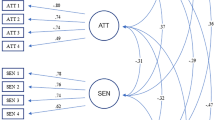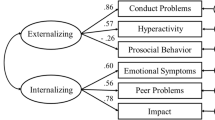Abstract
For 131 highly stressed 4th- to 6th-grade urban children, retrospective parental reports of child temperament along an easy-difficult dimension, for the infancy (ages 0–2) and preschool (ages 2–5) periods, were obtained during in-depth interviews. Parent judgments of an easier temperament in each of the two age periods, and their sum, related consistently and significantly to positive ratings of current child adjustment. The latter reflected both multiple sources (i.e., parents, former teachers, and current teachers) and different aspects of adjustment (e.g., fewer problem behaviors and more competencies).
Similar content being viewed by others
References
Allport, G. W. (1937).Personality: A psychological interpretation. New York: Holt.
Barron, A., & Earls, F. (1984). The relationship of social and temperament factors to behavior problems in three year-old children: A cross-national replication.Journal of Child Psychology and Psychiatry, 25, 23–33.
Bates, J. (1980). The concept of difficult temperament.Merrill-Palmer Quarterly, 26, 299–319.
Buss, A. H., & Plomin, R. (1975).A temperament theory of personality development. New York: John Wiley.
Carey, W., & McDevitt, S. (1978). Revision of the Infant Temperament Scale.Pediatrics, 735–739.
Chess, S., & Thomas, A. (1984).Origins and evaluation of behavior disorders: From infancy to early adult life. New York: Brunner/Mazel.
Cowen, E. L. (1991). In pursuit of Wellness.American Psychologist, 46, 404–408.
Cowen, E. L., Work, W. C., Wyman, P. A., Parker, G. R., Wannon, M., & Gribble, P. A. (1991). Test comparisons among stress-affected, stress resilient and non-classified 4th–6th grade urban children.Journal of Community Psychology, 20.
Earls, F. (1981). Temperament characteristics and behavior problems in three-year-old children.Journal of Nervous and Mental Disorders, 169, 367–373.
Fullard, W., McDevitt, S. C., & Carey, W. B. (1984). Assessing temperament in one to three year old children.Journal of Pediatric Psychology 9, 205–217.
Garmezy, N. (1981). Children under stress: Perspectives on antecedents and correlates of vulnerability and resistance to psychopathology. In A. I. Robin, J. Aronoff, A. M. Barclay, & R. A. Zucker (Eds.),Further explorations in personality, (pp. 196–269). New York: Wiley.
Garmezy, N. (1983). Stressors of childhood. In N. Garmezy & M. Rutter (Eds.),Stress, coping, and development in children (pp. 43–84). New York: McGraw-Hill.
Garmezy, N., Masten, A. S., & Tellegen, A. (1984). Studies of stress-resistant children: A building block for developmental psychopathology.Child Development 55, 97–111.
Garrison, W. T., & Earls, F. (1987).Temperament and child psychopathology. Newbury Park, CA: Sage.
Garrison, W. T. Earls, F., & Kindlon, D. (1984). Temperament characteristics in the third year of life and adjustment at school entry.Journal of Clinical Child Psychology, 13, 298–303.
Graham, P., Rutter, M., & George, S. (1973). Temperamental characteristics as predictors of behavior disorders in children.American Journal of Orthopsychiatry, 43, 328–339.
Hightower, A. D., Work, W. C., Cowen, E. L., Lotyczewski, B. S., Spinell, A. P. Guare, J. C., & Rohrbeck, C. A. (1986). The Teacher-Child Rating Scale: A brief objective measure of elementary children's school problem behaviors and competencies.School Psychology Review, 15, 393–409.
Keogh, B. (1982). Children's temperament and teachers' decisions. In CIBA Foundation'sTemperamental differences in infants and young children (pp. 269–285). London: Pitman.
Martin, R. P. (1985). Temperament: A review of research with implications for the school psychologist.School Psychology Review, 12, 266–275.
Martin, R. P. (1988). Child temperament and educational outcomes. In A. D. Pelligrini (Ed.),Psychological basis for early education (pp. 185–205). New York: John Wiley.
Martin, R. P., Nagle, R., & Paget, K. (1983). Relationships between temperament and classroom behavior, teacher attitudes, and academic achievement.Journal of Psychoeducational Assessment, 1, 377–386.
Parker, G. R., Cowen, E. L., Work, W. C., & Wyman, P. A. (1990). Stress resilient children in an urban setting.Journal of Primary Prevention, 11, 19–35.
Plomin, R. (1982). Childhood temperament. In B. Lahey & A. Kazdin (Eds.),Advances in clinical child psychology, Vol. 6, (pp. 2–80). New York: Plenum Press.
Pullis, M. E. (1979). An investigation of the relationship between children's temperament and school adjustment. Unpublished doctoral dissertation, University of California at Los Angeles.
Rothbart, M., & Derryberry, D. (1981). Development of individual differences in temperament. In M. E. Lamb & A. L. Brown (Eds.),Advances in developmental psychology Vol. 1, (pp. 37–86). Hillsdale, NJ: Erlbaum.
Rutter, M. (1983). Stress, coping and development: Some issues and some questions. In N. Garmezy & M. Rutter (Eds.),Stress, coping and development in children (pp. 1–41). New York: McGraw-Hill.
Scholom, A., & Schiff, G. (1980). Relating infant temperament to learning disabilities.Journal of Abnormal Child Psychology, 8, 127–132.
Scholom, A., Zucker, R., & Stollak, G. (1979). Relating early child adjustment to infant and parent temperament.Journal of Abnormal Child Psychology, 17, 297–303.
Thomas, A., & Chess, S. (1977).Temperament and development. New York: Brunner/Mazel.
Werner, E. E., & Smith, R. S. (1982).Vulnerable but invincible: A study of resilient children. New York: McGraw-Hill.
Work, W. C., Cowen, E. L., Parker, G. W., & Wyman, P. A. (1990). Stress resilient children in an urban setting.Journal of Primary Prevention, 11, 3–17.
Wyman, P. A., Cowen, E. L., Work, W. C., & Parker, G. R. (1991a). Developmental and family milieu interview correlates of resilience in urban children who have experienced major life-stress.American Journal of Community Psychology, 19, 405–426.
Wyman, P. A., Cowen, E. L., Work, W. C., Raoof, A., Gribble, P. A., Parker, G. R., & Wannon, M. (1991b). Interviews with children who experienced major life stress: Family and child attributes that predict resilient outcomes.Journal of the Academy of Child Psychology and Psychiatry,30.
Yarrow, M. R., Campbell, J. D., & Burton, R. V. (1970). Recollections of childhood: A study of the retrospective method.Monographs of the Society of Research on Child Development,35(5), (Serial No. 138).
Zax, M., & Cowen, E. L. (1976).Abnormal psychology: Changing conceptions (2nd ed.) New York: Holt, Rinehart, & Winston.
Author information
Authors and Affiliations
Additional information
This project was done with support from the William T. Grant Foundation, for which the authors express sincere gratitude. Thanks also to Dwayne D. Jarrell and Bohdan S. Lotyczewski who assisted in the data analyses.
Rights and permissions
About this article
Cite this article
Cowen, E.I., Wyman, P.A. & Work, W.C. The relationship between retrospective reports of early child temperament and adjustment at ages 10–12. J Abnorm Child Psychol 20, 39–50 (1992). https://doi.org/10.1007/BF00927115
Revised:
Issue Date:
DOI: https://doi.org/10.1007/BF00927115




